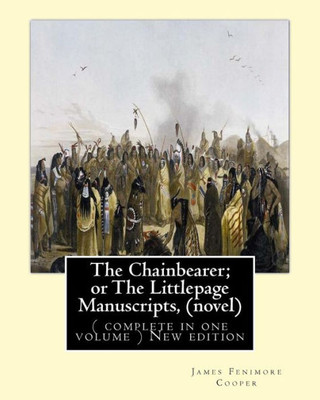The Chainbearer; or The Littlepage Manuscripts is a novel by the American novelist James Fenimore Cooper first published in 1845. The Chainbearer is the second book in a trilogy starting with Satanstoe and ending with The Redskins.The novel focuses mainly on issues of land ownership and the displacement of American Indians as the United States moves Westward. Themes Critical to the trilogy of these novels, is the sense of expansion through the measuring and acquisition of land by civilization.The title The Chainbearer represents "the man who carries the chains in measuring the land, the man who helps civilization to grow from the wilderness, but who at the same time continues the chain of evil, increases the potentiality for corruption."The central position of the "Chainbearer" allows Cooper to deal with the cultural lack of understanding Native Americans had of European concepts of land ownership. This in turn allows Cooper to critique ownership in general. Also, Cooper, like in many of his novels, focuses on the growing corruption of individuals in "civilization" as it expands. This Cooper attributes "an inherent principle in the corrupt nature of man to misuse all his privileges. . . . If history proves anything, it proves this." Two characters, in particular, represent this growing corruption of civilization, Andries Mordaunt, the chainbearer, and Aaron, known as "Thousandacres." The men represent different types of the civilization, Mordaunt as the usurper of old civilization and Thousandacres representing an older society which the new "civilization" means to usurp. Eventually this new civilization decides to embrace force in order to lay full claim on the land. This displacement of Native Americans by the ever expansionist Americans repeatedly becomes an issue for Cooper throughout the trilogy of novels. In so doing, Cooper presents a very strong critique of Americans and America. James Fenimore Cooper (September 15, 1789 - September 15, 1851) was a prolific and popular American writer of the early 19th century. His historical romances of frontier and Indian life in the early American days created a unique form of American literature. He lived most of his life in Cooperstown, New York, which was founded by his father William on property that he owned. Cooper was a lifelong member of the Episcopal Church and, in his later years, contributed generously to it.He attended Yale University for three years, where he was a member of the Linonian Society, but was expelled for misbehavior.Before embarking on his career as a writer, he served in the U.S. Navy as a Midshipman, which greatly influenced many of his novels and other writings. The novel that launched his career was The Spy, a tale about counterespionage set during the Revolutionary War and published in 1821.He also wrote numerous sea stories, and his best-known works are five historical novels of the frontier period known as the Leatherstocking Tales. Among naval historians, Cooper's works on the early U.S. Navy have been well received, but they were sometimes criticized by his contemporaries. Among his most famous works is the Romantic novel The Last of the Mohicans, often regarded as his masterpiece.
- | Author: James Fenimore Cooper
- | Publisher: CreateSpace Independent Publishing Platform
- | Publication Date: Jul 05, 2016
- | Number of Pages: 248 pages
- | Language: English
- | Binding: Paperback
- | ISBN-10: 1535107308
- | ISBN-13: 9781535107303




